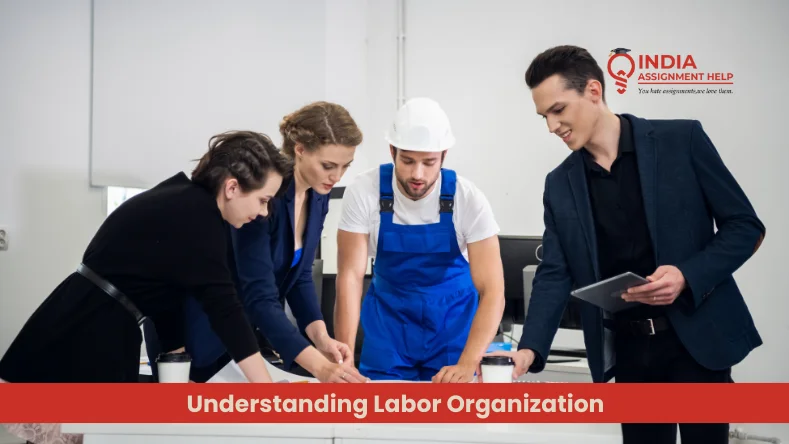Understanding Labor Organization

Labour organisation refers to the collective representation and advocacy efforts of workers to protect their rights, improve working conditions, and negotiate with employers or government authorities. It encompasses various forms of organising, including trade unions, labour federations, workers' associations, and other entities that aim to promote the interests and welfare of workers. Here’s a detailed exploration of labour organisation:
Labour organisation plays a pivotal role in shaping labour relations and influencing socio-economic policies. It typically involves:
1. Trade Unions and Labor Federations
- Representation: Trade unions represent workers collectively, advocating for better wages, benefits, working conditions, and job security.
- Collective Bargaining: Negotiating collective agreements with employers on behalf of workers to establish terms of employment, including wages, hours of work, and grievance procedures.
- Political Advocacy: Engaging in political lobbying and activism to influence legislation and policies that impact workers' rights and interests.
2. Workers' Associations and Grassroots Movements
- Informal Sector Organizing: Organising workers in the informal economy to address issues such as informal employment, precarious work, and lack of social protection.
- Sectoral and Occupational Groups: Forming associations based on specific industries or occupations to address sector-specific challenges and promote professional standards.
3. International and National Organizations
- International Labor Organizations: Organisations like the International Labour Organization (ILO) facilitate global dialogue on labour standards, promote social justice, and support capacity-building efforts in member states.
- National Labor Federations: National-level federations of trade unions coordinate collective action, provide support to member unions, and represent workers in broader socio-economic debates.
Importance of Labor Organization
Labour organisation serves several critical purposes in modern societies:
- Protecting Worker Rights: Ensuring fair treatment, safety at work, and protection against discrimination, exploitation, and unfair dismissal.
- Promoting Social Justice: Advocating for policies that reduce income inequality, promote gender and racial equity, and enhance social welfare provisions.
- Economic Influence: Contributing to economic stability and growth by fostering productive labour relations, reducing labour disputes, and improving labour market efficiency.
- Political Engagement: Mobilising workers' voices in democratic processes, influencing electoral outcomes, and shaping public policies related to labour rights and social welfare.
Challenges and Future Directions
Despite its importance, labour organisation faces challenges such as:
- Globalisation and Technological Change: Adapting to global economic shifts, digitalization of work, and the rise of gig economy platforms.
- Legal and Regulatory Constraints: Navigating restrictive labour laws, anti-union practices by employers, and limitations on collective bargaining rights.
- Diversity and Inclusion: Addressing the needs of diverse workforce demographics, including women, migrants, and informal sector workers.
Conclusion
Labour organisation continues to evolve in response to changing economic, social, and political landscapes. By organising collectively, workers can leverage their strength to secure better working conditions, protect their rights, and contribute to broader societal goals of equity and justice. Understanding the dynamics of labour organisation is crucial for policymakers, employers, and workers alike in fostering inclusive and sustainable development.
FAQs
Q1. What is the role of trade unions in labour organisation?
A1. Trade unions play a crucial role in labour organisation by representing workers collectively in negotiations with employers for better wages, working conditions, and benefits. They also advocate for legislative changes to protect workers' rights and ensure fair treatment in the workplace.
Q2. How do workers benefit from joining a trade union?
A2. Joining a trade union provides workers with collective bargaining power to negotiate better pay, hours of work, and job security. Unionised workers often have access to legal support, training programs, and solidarity networks that enhance workplace rights and protections.
Q3. What challenges do labour organisations face in the modern economy?
A3. Labour organisations face challenges such as globalisation, which shifts jobs across borders and introduces new competition. Additionally, technological advancements and the rise of the gig economy pose challenges in organising and representing diverse types of workers.
Q4. How does labour organisation contribute to social justice?
A4. Labour organisations promote social justice by advocating for policies that reduce income inequality, promote fair wages, and address workplace discrimination based on gender, race, or ethnicity. They also campaign for improved social welfare benefits and protections for vulnerable workers.
Q5. What is the role of international labour organisations like the ILO?
A5. International labour organisations such as the International Labour Organization (ILO) set global labour standards, promote decent work conditions worldwide, and facilitate dialogue between governments, employers, and workers on labour rights and policies. They support member states in implementing these standards and monitoring compliance.





